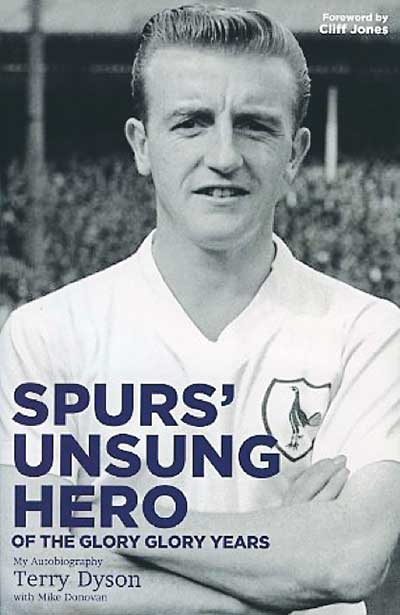 My autobiography
My autobiography
by Terry Dyson with
Mike Donovan
Pitch Publishing, £18.99
Reviewed by Alan Fisher
From WSC 342 August 2015
“The game is about glory,” proclaim the hoardings on all sides of White Hart Lane. Before it was plundered by the marketing department, Terry Dyson was one of the creators of Tottenham Hotspur’s proud heritage. In 1961 Spurs became the first team since 1897 to win the Double, with 11 straight league wins at the start of the season. Two years later they were the first British team to win a European trophy, the Cup-Winners Cup. Dyson is one of the lesser-known stars of a team managed by Bill Nicholson that included Danny Blanchflower, the indomitable Dave Mackay, Cliff Jones, Bobby Smith and perhaps the best of them all, “the Ghost” John White (who was killed by lightning on a golf course in 1964).
Born in Scarborough where his father was a well-known but impoverished jockey, Dyson was spotted in 1954 playing for the army during his national service. Over the next decade he made 244 appearances for Spurs as a hard-working little left-winger, scoring 68 goals including two in his finest match, the 5-1 Cup-Winners Cup final victory.
Much of the book is understandably taken up with the Double season, rich with insider detail and anecdotes on a game-by-game basis that will fascinate Spurs fans, while the less committed reader can’t help but be swept along by Dyson’s enthusiasm and growing sense of destiny. However, the abiding impression is one of humility, a simple delight in playing good football with team-mates he liked, admired and respected. His description of soft-voiced conversation and calm satisfaction in the Wembley dressing room after the Cup win to seal the Double is typical and evocative, striking for its lack of brazen celebration even though they were perfectly entitled to let go. Nicholson was genuinely upset that the team had let themselves down because their performance was below their best.
Dyson played in a very different era, being paid £40 in weekly wages even after the season’s other momentous event, the abolition of the maximum wage. He lived locally in digs with the same family for ten years and drank after matches with the fans in the Bell and Hare pub next to the ground. He bemoans the separation between supporter and player that is the norm today. However the most telling sign of different times is that the editor felt the rules of Dyson’s favourite playground game, conkers, had to be explained in detail to an apparently bewildered readership.
Yet in many ways this was an entirely modern team. The cheerful Dyson recounts how he and his team-mates talked football incessantly, supporting each other on and off the pitch. Contrast Gary Neville’s recent criticism of the lack of on-field intelligence and problem-solving in the English game.
Later in his career Dyson played for Fulham and Colchester, then managed in non-League and coached in local schools. Spurs fans of all vintages will revel in this account of a man who was part of a team contemporaries called the finest of all time yet who remains humble. Now a sprightly 80 the stories he is able to tell allow Terry Dyson to step into the limelight.


